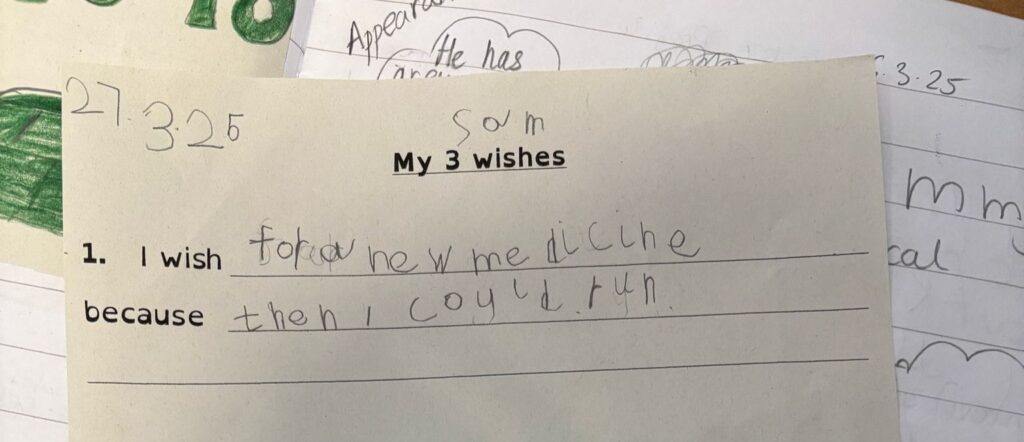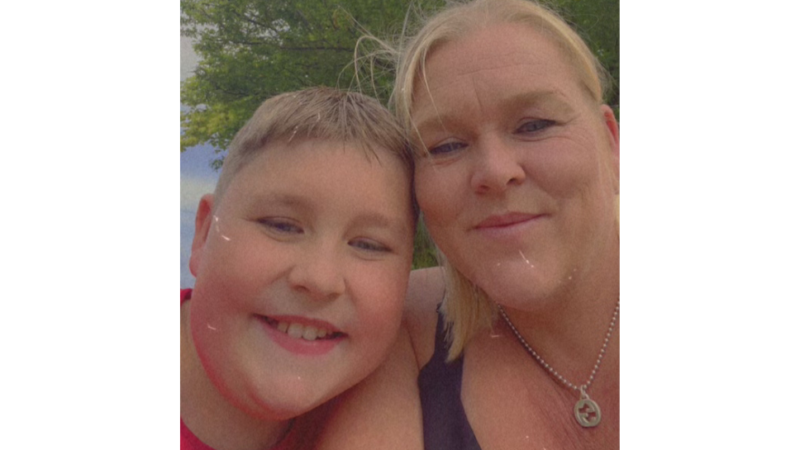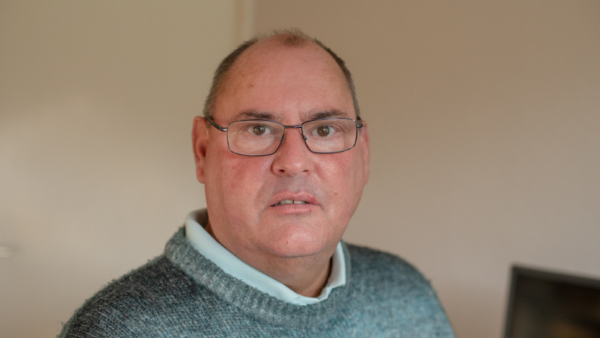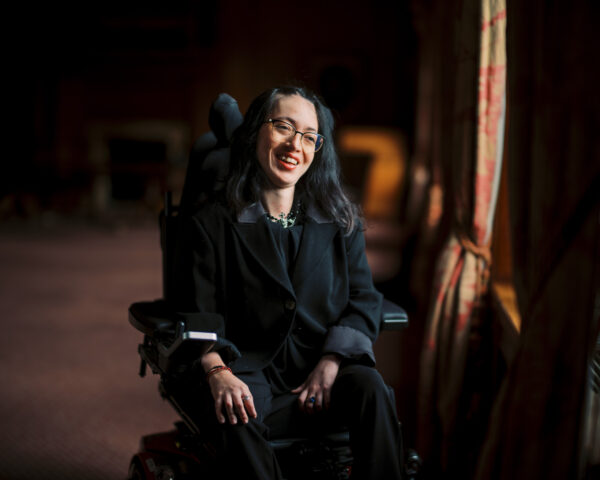Stephen, Sam’s dad, shares the emotional turmoil waiting for the treatment givinostat is having on his family.
“My son’s biggest wish is for ‘a new medicine because then he might be quicker on his feet.’ It breaks my heart he’s being denied that chance” – waiting for givinostat

Givinostat is currently being assessed for NHS use, but a decision isn’t expected until later this year. In the meantime, givinostat is available free of charge through an Expanded Access Programme (EAP) – but only if the NHS provides the extra support like staffing, appointments and tests that are needed. Right now, most hospitals lack the resources needed, meaning many families are left waiting for treatment that could make a difference. Read more about the process and EAP here.
Watching your child get weaker and weaker, knowing what the future holds, is the worst kind of heartbreak. We experience guilt, helplessness, and fear, every day. But knowing there’s a treatment that could help and not being able to access it… that’s a whole new type of heartache. We’re angry. Confused. And terrified that time will run out before the system catches up.
Hope is in front of us, but it’s just out of reach
When givinostat was conditionally approved in December last year, we couldn’t believe there was a treatment Sam could receive that would hopefully slow the progression of his condition. Sam is still able to walk short lengths, so givinostat could keep him on his feet for longer – prolonging his independence would be the most amazing thing. But it’s almost six months since this was announced, and Sam is still waiting. Still getting weaker.
We had an appointment with Sam’s consultant in January. We were hoping he’d be offered givinostat then, but he wasn’t. The consultant told us they were working out the additional resources and other things they would need to start the Expanded Access Programme at his hospital.
My wife and I understand there are logistics to hospitals providing access to new treatments, but there’s not a single family in Scotland who have started receiving givinostat yet, and only a small handful in the whole of the UK. We haven’t been given any idea of timeframes for when Sam might be able to receive the treatment. His consultant called us a couple of weeks ago and said that it’ll hopefully be available to Sam “soon”, but what if that’s not soon enough?
Our boys are getting weaker by the day
Our family went on holiday last October in a caravan. Sam loves the beach and playing with his brothers – he had a great time and didn’t fall over at all. We took the same trip last month in the Easter holidays and Sam struggled a lot more, falling over several times. Seeing such a decline so quickly in Sam’s strength is terrifying and impossibly hard for him.

These falls can have serious consequences. Not long after his diagnosis, Sam had a bad fall at school. His legs gave out, and he fell off a low wall. He cracked his skull and had a bleed on the brain which meant we spent a terrifying week in hospital.
Sam just wants to play like every eight-year-old
Sam knows he has “tired legs.” He knows his condition mean’s he can’t do everything his friends and brothers can. But he doesn’t know the full picture yet. He has to use his wheelchair most days at school now. He also has a walking frame, and we give him the option to choose between the two depending on how tired his legs feel that day, but there are increasingly fewer days where the walker is enough support.
When Sam found out there’s a medicine that might help him, the first thing he asked me was, “If I take that, would I not need my chair so much?” I told him maybe. His face lit up. That little bit of hope meant everything to him, and to us.
He gets frustrated and upset when he can’t join in with his friends. We had parents evening last week, and the teacher showed us Sam’s responses to an activity they’d been doing in class. The kids had to write their top three wishes. The first one Sam had written was “For a new medicine because then I could run.” All we want is to give him that chance, or at least maintain his current strength, while he still has it.

Every delay causes further, irreversible damage.
Every day we wait, more of Sam’s strength disappears. And once it’s gone, it doesn’t come back. So, let’s pull together and continue to fight for access to treatment for our boys.
Read more about the assessment process for givinostat and the EAP here.

Take action
Engage with clinicians and NHS bodies
- Contact your NHS Trust or Health Board: These are the decision makers – it is up to each local NHS Trust or Board to decide whether a centre will take part in the Expanded Access Programme. Ask if the treatment is under local review, available via a clinical trial or special funding pathway. To contact your local NHS Board or Trust, visit the official NHS website for your country (England, Scotland, Wales, or Northern Ireland), search by postcode or region, and use the contact details listed for your local provider. If you would like a template letter to send to your NHS Trust or Health Board, email info@musculardystrophyuk.org.
- Talk to your clinician or specialist: They may be able to advocate on you and your child’s behalf.
Contact your parliamentarian
- Write to or ask to meet with your MP/MSP/MLA: Ask them to raise your concerns in Parliament, with NHS decision-makers, or submit written questions. If you would like a template letter to send to your MSP, MLA, or MP, email info@musculardystrophyuk.org.
Contact your local press
- Contact your local newspaper, TV and radio and share your story. Many families have done this already to raise awareness of the issue.
Connect with other families facing similar challenges
- Peer networks can provide emotional support, share practical advice, and offer insights into navigating the system more effectively. We have Duchenne and parents and carers WhatsApp groups, and we also have a parents and carers Facebook group. Find out more.
Submit a formal complaint
- You can file a formal complaint through the NHS complaints process. To make a complaint to your NHS Board or Trust, you can contact their Patient Advice and Liaison Service (PALS) or complaints department directly (usually by phone, email, or an online form). Details are usually available on their official website. You can escalate your complaint to the Parliamentary and Health Service Ombudsman if the situation remains unresolved.
We understand this is a difficult time for families trying to access givinostat. If you need support please do reach out to our helpline, call 0800 652 6352 or email info@musculardystrohyuk.org


